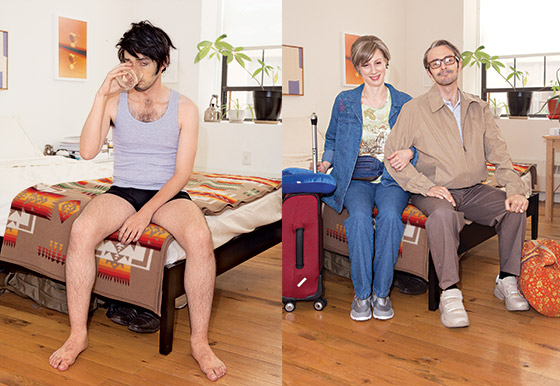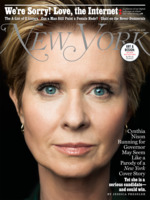 |
(Photo: Peter Funch) |
In 2009, 21,000 people stayed in Airbnbs. In 2010, the number rose to 140,000, and then the following year to 800,000. Venture-capital funding poured in. Chesky was elected CEO. In interviews, he began referring to Airbnb as a “movement” and as being at the forefront of “a revolution.”
Airbnb now hosts roughly 400,000 guests a night. This spring, the company raised a round of funding that valued the company at $10 billion, thereby ensuring the founders will never have trouble paying rent again. They’re still in the same apartment, by the way. “It reminds me of our roots,” Chesky says, which is one of the reasons they constructed a life-size replica of it in Airbnb’s vast new headquarters in San Francisco, a sprawling tower of glass and steel that also houses replicas of their favorite Airbnbs in cities like Paris, Copenhagen, and Bali; a cafeteria serving free healthy cuisine; a climbing-ivy wall regularly spritzed by a landscaper; and a gymnasium-size model of the company’s new logo. “People warned them it looked like a vagina,” one employee says, walking by the curvy fiberglass object on the mezzanine.
Chesky is right. It is crazy that just six years ago Airbnb was the loopy idea of a couple of art students and now it’s a giant corporation, thundering around the globe, influencing policy decisions, blundering into discussions about economics and technology and class. Like a cute kid who has rapidly matured into a horny teenager, it’s gone from being a small company with presumably good intentions to a corporation large enough to have questionable ones. “When you’re a two-person start-up, everyone wants you to succeed,” says Alfred Lin of Sequoia Capital, an early investor. “And then when you’re a big guy, and you start throwing your weight around to get what you want …”
Well, that’s when people stop being polite. And start getting real.
In New York, Airbnb happened slowly and then all at once. What’s that about, you’d wonder, as you saw a group of tall Swedes dragging their suitcases down a Brooklyn block. Then Airbnb-ing became a verb and a fact of New York life. You saw them everywhere: fumbling through change purses at the coffee shop on the corner, walking through Smorgasburg in unwieldy packs, swiping their MetroCards slowly and ineffectively while a line of locals groaned softly behind them. “You get a lot of French, Germans, Scandinavians,” says a friend of mine who lived for a year off renting her Williamsburg studio. “You can get Australians if you set your calendar out far enough. They like to plan ahead.”
Soon, everyone had had some kind of Airbnb Experience, as a host or a guest. There were happy stories: Once, someone’s Irish grandmother cleaned my friend’s place top to bottom thinking it belonged to a friend of her grandson’s—“he didn’t want her to know he was paying for it, which was so sweet.” And there were horror stories: “And then”—this is another friend—“I walked into the kitchen and the guy was standing there totally naked.” Then there were the real horror stories, of the genre Businessweek dubbed “Airbnb noir.” One host returned to his Chelsea apartment to find it the site of an “overweight orgy” (as the New York Post put it), and a prostitute who used someone’s East Village apartment for in-calls got stabbed by one of them. Encounters with the dark side of humanity—not to mention their puke, feces, and “dark and curlies,” per the Airbnb message board—this was not the kind of intimacy the founders intended to foster. But that was just one of the problems they didn’t foresee.
It wasn’t long before some of these stories made their way to the office of State Senator Liz Krueger. Located in a nondescript office building on the far, far Upper East Side, behind a rack of scaffolding and a row of construction workers doing a modern-day reenactment of the famous photograph of guys lunching on an I-beam, Krueger’s tiny warren of rooms is basically the opposite of Airbnb’s airy headquarters. As are the senator’s opinions. “She lives to destroy us,” one person at Airbnb complained. But to be fair, she’s been trying to destroy businesses like Airbnb since Chesky and Gebbia were in short pants.
“How long have I been working on this, Andrew?” asks the blonde, chatty senator, peering out from behind her cluttered desk.
“It feels like forever,” says her earnest 28-year-old spokesman, Andrew Goldston.
In 2002, not long after Krueger took office, she began getting calls from constituents complaining about short-term rentals in their buildings. “Somehow the landlord had made a deal through an Italian visitor website,” she says. “Now, I love Italy. Italy’s my favorite country to travel to, so don’t get this wrong. But it was like, all these elderly people living in rent-regulated apartments, and the landlord was marketing specifically to young Italian men who traveled, like, in groups of ten to 20. And groups of young men—it doesn’t matter what country they come from—they drink. And they party. And, that’s okay. It’s okay to be a wild, fun tourist, and we have laws for hotels about security and noise and multiple levels of fire code for large groups of loud, raucous, partying kinds of tourists. But apartment buildings where people live are not set up for that. So it was like, ‘Help, I’m being inundated by, like, drunk, wild young men’—I don’t mean to be sexist, but they happen to be young men—‘every night who are vomiting in my hallways. And playing soccer against my wall. And singing and throwing up.’ ”







